- Clone
- 2C9.G2 (HMβ3-1) (See other available formats)
- Regulatory Status
- RUO
- Other Names
- β3 integrin, Integrin β3 chain, gpIIIa
- Isotype
- Armenian Hamster IgG
- Ave. Rating
- Submit a Review
- Product Citations
- publications
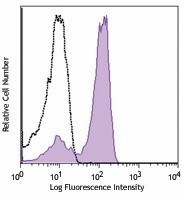
-

C57BL/6 mouse bone marrow cells were stained with CD61 (clone 2C9.G2) APC (filled histogram) or Armenian hamster IgG APC isotype control (open histogram). Data shown was gated on myeloid cell population.
| Cat # | Size | Price | Quantity Check Availability | Save | ||
|---|---|---|---|---|---|---|
| 104315 | 25 µg | 82€ | ||||
| 104316 | 100 µg | 186€ | ||||
CD61 is a 110 kD integrin β chain also known as β3 integrin or gpIIIa. It associates with the integrin αv chain (CD51) to form the vitronectin receptor. In addition, CD61 can associate with the integrin αIIb chain (CD41) to form the gpIIb/IIIa complex. CD61 is expressed on platelets, megakaryocytes, endothelium, smooth muscle, a subset of B cells, myeloid cells, osteoclasts, and mast cells. CD61, in conjunction with CD41 or CD51, mediates adhesion to fibronectin, fibrinogen, vitronectin, thrombospondin, and von Willebrand factor. Leukocyte-endothelial adhesion is mediated by the binding of αv/β3 integrin or vitronectin receptor to CD31 (PECAM-1).
Product DetailsProduct Details
- Verified Reactivity
- Mouse, Rat
- Antibody Type
- Monoclonal
- Host Species
- Armenian Hamster
- Immunogen
- Vitronectin receptor protein from the mouse T-cell hybridoma 2B4.
- Formulation
- Phosphate-buffered solution, pH 7.2, containing 0.09% sodium azide.
- Preparation
- The antibody was purified by affinity chromatography and conjugated with APC under optimal conditions.
- Concentration
- 0.2 mg/ml
- Storage & Handling
- The antibody solution should be stored undiluted between 2°C and 8°C, and protected from prolonged exposure to light. Do not freeze.
- Application
-
FC - Quality tested
- Recommended Usage
-
Each lot of this antibody is quality control tested by immunofluorescent staining with flow cytometric analysis. For flow cytometric staining, the suggested use of this reagent is ≤0.5 µg per million cells in 100 µl volume. It is recommended that the reagent be titrated for optimal performance for each application.
- Excitation Laser
-
Red Laser (633 nm)
- Application Notes
-
The Ultra-LEAF™ purified antibody (Endotoxin < 0.01 EU/µg, Azide-Free, 0.2 µm filtered) is recommended for functional assays (Cat. No. 104325 and 104326).
-
Application References
(PubMed link indicates BioLegend citation) -
- Kieffer N, et al. 1990. Annu. Rev. Cell Biol. 6:329. (Block)
- Piali L, et al. 1995. J. Cell Biol. 130:451. (Block)
- Ashkar S, et al. 2000. Science 287:860. (Block)
- Schultz JF, et al. 1995. J. Biol. Chem. 270:11522. (Block)
- Moulder K, et al. 1991. J. Exp. Med. 173:343. (Activ)
- Carlson TR, et al. 2008.135:2193. PubMed
- Yamaji D, et al. 2009. Genes Dev. 23:2382. PubMed
- Product Citations
-
- RRID
-
AB_2561733 (BioLegend Cat. No. 104315)
AB_2561733 (BioLegend Cat. No. 104316)
Antigen Details
- Structure
- Integrin family, 110 kD
- Distribution
-
Platelets, megakaryocytes, endothelium, smooth muscle, activated T cells, subset of B cells, monocytes, macrophages, osteoclasts, mast cells
- Function
- Attachment to matrix
- Ligand/Receptor
- Fibrinogen, von Willebrand factor, fibronectin
- Cell Type
- B cells, Endothelial cells, Macrophages, Mast cells, Megakaryocytes, Monocytes, Osteoclasts, Platelets, T cells
- Biology Area
- Cell Adhesion, Cell Biology, Immunology
- Molecular Family
- Adhesion Molecules, CD Molecules
- Antigen References
-
1. Barclay A, et al. 1997. The Leukocyte Antigen FactsBook. Academic Press.
2. Phillips DR, et al. 1991. Cell. 65:359.
3. Felding-Habermann B, et al. 1993. Curr Opinion Cell Biol. 5:864. - Gene ID
- 16416 View all products for this Gene ID 29302 View all products for this Gene ID
- UniProt
- View information about CD61 on UniProt.org
Related Pages & Pathways
Pages
Related FAQs
Other Formats
View All CD61 Reagents Request Custom Conjugation| Description | Clone | Applications |
|---|---|---|
| Biotin anti-mouse/rat CD61 | 2C9.G2 (HMβ3-1) | FC |
| FITC anti-mouse/rat CD61 | 2C9.G2 (HMβ3-1) | FC |
| PE anti-mouse/rat CD61 | 2C9.G2 (HMβ3-1) | FC |
| Purified anti-mouse/rat CD61 | 2C9.G2 (HMβ3-1) | FC,IHC |
| Alexa Fluor® 488 anti-mouse/rat CD61 | 2C9.G2 (HMβ3-1) | FC |
| Alexa Fluor® 647 anti-mouse/rat CD61 | 2C9.G2 (HMβ3-1) | FC |
| APC anti-mouse/rat CD61 | 2C9.G2 (HMβ3-1) | FC |
| PE/Cyanine7 anti-mouse/rat CD61 | 2C9.G2 (HMβ3-1) | FC |
| PerCP/Cyanine5.5 anti-mouse/rat CD61 | 2C9.G2 (HMβ3-1) | FC |
| PE/Dazzle™ 594 anti-mouse/rat CD61 | 2C9.G2 (HMβ3-1) | FC |
| TotalSeq™-C0910 anti-mouse/rat CD61 | 2C9.G2 (HMβ3-1) | PG |
| Ultra-LEAF™ Purified anti-mouse/rat CD61 | 2C9.G2 (HMβ3-1) | FC,Block,Activ,IHC |
| TotalSeq™-A0910 anti-mouse/rat CD61 | 2C9.G2 (HMβ3-1) | PG |
| TotalSeq™-B0910 anti-mouse/rat CD61 | 2C9.G2 (HMβ3-1) | PG |
Customers Also Purchased
Compare Data Across All Formats
This data display is provided for general comparisons between formats.
Your actual data may vary due to variations in samples, target cells, instruments and their settings, staining conditions, and other factors.
If you need assistance with selecting the best format contact our expert technical support team.
-
Biotin anti-mouse/rat CD61
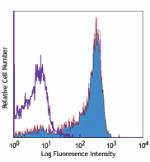
C57BL/6 mouse bone marrow cells stained with biotinylated 2C... -
FITC anti-mouse/rat CD61
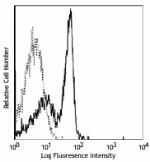
C57BL/6 mouse bone marrow cells stained with HMβ3-1 FITC -
PE anti-mouse/rat CD61
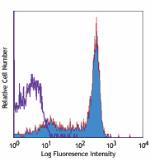
C57BL/6 mouse bone marrow cells stained with 2C9.G2 PE -
Purified anti-mouse/rat CD61
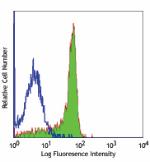
C57BL/6 mouse bone marrow cells stained with purified 2C9.G2... -
Alexa Fluor® 488 anti-mouse/rat CD61
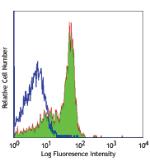
C57BL/6 mouse bone marrow cells stained with 2C9.G2 Alexa Fl... -
Alexa Fluor® 647 anti-mouse/rat CD61
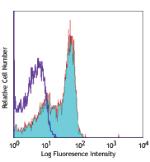
C57BL/6 mouse bone marrow cells stained with 2C9.G2 Alexa Fl... -
APC anti-mouse/rat CD61
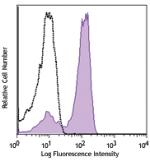
C57BL/6 mouse bone marrow cells were stained with CD61 (clon... -
PE/Cyanine7 anti-mouse/rat CD61
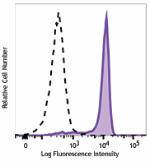
C57BL/6 mouse bone marrow cells were stained with CD61 (clon... -
PerCP/Cyanine5.5 anti-mouse/rat CD61
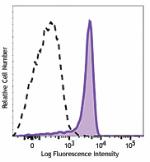
C57BL/6 mouse bone marrow cells were stained with CD61 (clon... -
PE/Dazzle™ 594 anti-mouse/rat CD61
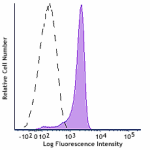
C57BL/6 mouse bone marrow cells were stained with CD61 (clon... -
TotalSeq™-C0910 anti-mouse/rat CD61
-
Ultra-LEAF™ Purified anti-mouse/rat CD61
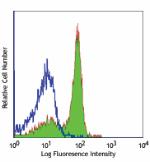
C57BL/6 mouse bone marrow cells stained with Ultra-LEAF™ pur... -
TotalSeq™-A0910 anti-mouse/rat CD61
-
TotalSeq™-B0910 anti-mouse/rat CD61

 Login / Register
Login / Register 











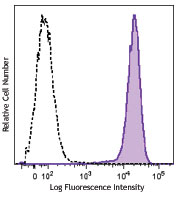
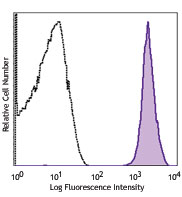
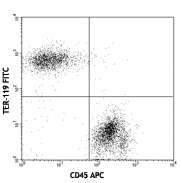
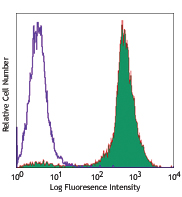



Follow Us